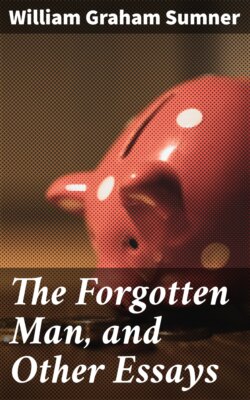Читать книгу The Forgotten Man, and Other Essays - William Graham Sumner - Страница 27
На сайте Литреса книга снята с продажи.
(B) Economic Units not National Units.
Оглавление69. The protectionists say that their system advances civilization inside a state and makes it great, but the facts are all against them (see §136ff). It was by trade that civilization was extended over the earth. It was through the contact of trade that the more civilized nations transmitted to others the alphabet, weights and measures, knowledge of astronomy, divisions of time, tools and weapons, coined money, systems of numeration, treatment of metals, skins, and wool, and all the other achievements of knowledge and invention which constitute the bases of our civilization. On the other hand, the nations which shut themselves up and developed an independent and self-contained civilization (China and Japan) present us the types of arrested civilization and stereotyped social status. It is the penalty of isolation and of withdrawal from the giving and taking which properly bind the whole human race together, that even such intelligent and highly endowed people as the Chinese should find their high activity arrested at narrow limitations on every side. They invent coin, but never get beyond a cast copper coin. They invent gunpowder, but cannot make a gun. They invent movable types, but only the most rudimentary book. They discover the mariner’s compass, but never pass the infancy of ship-building.
70. The fact is, then, that trade has been the handmaid of civilization. It has traversed national boundaries, and has gradually, with improvement in the arts of transportation, drawn the human race into closer relations and more harmonious interests. The contact of trade slowly saps old national prejudice and religious or race hatreds. The jealousies which were perpetuated by distance and ignorance cannot stand before contact and knowledge. To stop trade is to arrest this beneficent work, to separate mankind into sections and factions, and to favor discord, jealousy, and war.
71. Such is the action of protectionism. The protectionists make much of their pretended “nationalism,” and they try to reason out some kind of relationship between the scope of economic forces and the boundaries of existing nations. The argumentation is fatally broken at its first step. They do not show what they might show, viz., that the scope of economic forces on any given stage of the arts does form economic units. An English county was such a unit a century ago. I doubt if anything less than the whole earth could be considered so to-day, when the wool of Australia, the hides of South America, the cotton of Alabama, the wheat of Manitoba, and the meat of Texas meet the laborers in Manchester and Sheffield, and would meet the laborers in Lowell and Paterson, if the barriers were out of the way. But what the national protectionist would need to show would be that the economic unit coincides with the political unit. He would have to affirm that Maine and Texas are in one economic unit, but that Maine and New Brunswick are not; or that Massachusetts and Minnesota are in one economic unit, but that Massachusetts and Manitoba are not. Every existing state is a product of historic accidents. Mr. Jefferson set out to buy the city of New Orleans. He awoke one morning to find that he had bought the western half of the Mississippi Valley. Since that turned out so, the protectionists think that Missouri and Illinois prosper by trading in perfect freedom.6 If it had not turned out so, it would have been very mischievous for them to trade in perfect freedom. Nova Scotia did not join the revolt of our thirteen colonies. Hence it is thought ruinous to let coal and potatoes come in freely from Nova Scotia. If she had revolted with us, it would have been for the benefit of everybody in this union to trade with her as freely as we now trade with Maine. We tried to conquer Canada in 1812–1813 and failed. Consequently the Canadians now put taxes on our coal and petroleum and wheat, and we put taxes on their lumber, which our coal and petroleum industries need. We did annex Texas, at the cost of war, in 1845. Consequently we trade with Texas now under absolute freedom, but, if we trade with Mexico, it must be only very carefully and under stringent limitations. Is this wisdom, or is it all pure folly and wrongheadedness, by which men who boast of their intelligence throw away their own chances?7
72. Trade is a beneficent thing. It does not need any regulation or restraint. There is no point at which it begins to be dangerous. It is mutually beneficent. If it ceases to be so, it ceases entirely, because he who no longer gains by it will no longer carry it on. (See §125.)
